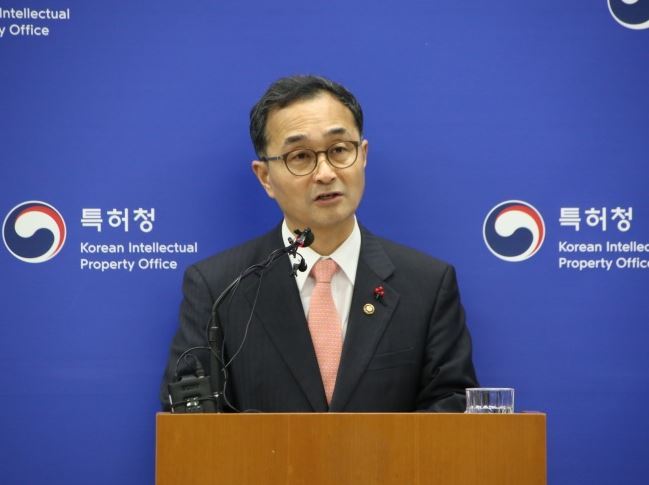Govt vows to promote ‘IP-based financing’ for tech SMEs
KIPO, FSC will boost IP finance budget to W2tr by 2022
By Bae HyunjungPublished : Dec. 11, 2018 - 16:23
The South Korean government will ease the criteria for intellectual property-backed lending and drastically increase the related state budget, seeking to promote small-sized tech companies’ access to loans, officials said Tuesday.
According to the mid-term plan, small and medium-sized enterprises that own valid patents may save up to 60 billion won ($53 million) in interest cost over the next five years, thanks to low-interest IP-backed loans. Loan accessibility will also be improved as the range of IP-backed lenders is to be expanded from state-run banks to most of the leading commercial banks.
The Korean Intellectual Property Office and the Financial Services Commission on Tuesday held a joint press briefing to present comprehensive actions to invigorate the IP finance system, focusing on small-sized technology firms. The latest announcement came as a follow-up action to the government’s earlier vow to help companies secure loans using their movable assets.
“Intellectual property is a key source of added value in this age of the ‘fourth industrial revolution’ but its application in the financial sector has remained limited, due to the banks’ dependence on mortgage and credit loans, insufficient public awareness of IP value, and a lack of related legal infrastructure,” said KIPO Commissioner Park Won-joo.
“The goal is to encourage the influx of market funds into innovative industrial sectors and to eventually trigger new employment and economic revitalization.”
According to the mid-term plan, small and medium-sized enterprises that own valid patents may save up to 60 billion won ($53 million) in interest cost over the next five years, thanks to low-interest IP-backed loans. Loan accessibility will also be improved as the range of IP-backed lenders is to be expanded from state-run banks to most of the leading commercial banks.
The Korean Intellectual Property Office and the Financial Services Commission on Tuesday held a joint press briefing to present comprehensive actions to invigorate the IP finance system, focusing on small-sized technology firms. The latest announcement came as a follow-up action to the government’s earlier vow to help companies secure loans using their movable assets.
“Intellectual property is a key source of added value in this age of the ‘fourth industrial revolution’ but its application in the financial sector has remained limited, due to the banks’ dependence on mortgage and credit loans, insufficient public awareness of IP value, and a lack of related legal infrastructure,” said KIPO Commissioner Park Won-joo.
“The goal is to encourage the influx of market funds into innovative industrial sectors and to eventually trigger new employment and economic revitalization.”

The government’s five-year target, according to KIPO and FSC, is to expand the yearly amount of IP lending up to 2 trillion won by 2022 from 450 billion won this year, and the number of beneficiary firms to 2,960 from 741 in the same period.
“Starting next year, IP-backed lending will be available at most of the commercial banks including Woori, Shinhan, and KEB Hana, improving the loan accessibility of startups and venture firms,” Park said.
Conventionally, IP-backed lending was mostly operated by state-run banks -- the Korea Development Bank and Industrial Bank of Korea. KB Kookmin Bank was the only private bank to provide the service.
IP-backed loans not only allow companies to secure funds through their intangible intellectual assets but also offer a relatively low interest rate ranging from 2 to 6 percent.
To encourage banks to expand IP-based lending, the government is working on establishing a recovery institution that liquidates the repossessed intellectual assets through licensing or disposal, officials said.
In addition, KIPO will send an automatic notification to the lending bank, should the legal relationship concerning the IP collateral undergo changes, and cut down on the registration fee for the bank, in case it is to take over ownership of the IP collateral due to the borrower’s default.
While encouraging IP-backed lending at commercial banks, the government will also work on nurturing IP investment funds, seeking to raise 500 billion won over the next four years and to promote private investment, according to the IP office.
“The idea is to diversify the target and method of IP investment in order to expedite the influx of private funds into the IP finance ecosystem,” Park explained.
The IP office will therefore operate the funds on a two-track system, maintaining and increasing the current input for patents and expanding investment for nonpatent IP, such as trademarks and design rights.
As part of its efforts to support tech SMEs, KIPO will subdivide the value assessment system for IP assets, allowing companies to choose the optimal module according to their business needs and budget capacities.
Starting next year, companies may choose one of four assessment models -- fees varying from 2 million won to 15 million won and the assessment period from two weeks to six weeks -- instead of the conventional time-consuming process that assessed all criteria en bloc.
The number of firms subject to KIPO’s IP assessment subsidy will also be increased to some 3,000 by 2020 from 654 in 2017, the office added.
“We expect that these comprehensive measures will contribute to creating about 9,400 new jobs by 2020,” the KIPO chief said.
“KIPO will closely cooperate with the FSC, the Ministry of Economy and Finance, and other financial organizations in drafting the related laws within the year and legislating them next year.”
By Bae Hyun-jung (tellme@heraldcorp.com)






![[From the Scene] Monks, Buddhists hail return of remains of Buddhas](http://res.heraldm.com/phpwas/restmb_idxmake.php?idx=644&simg=/content/image/2024/04/19/20240419050617_0.jpg&u=20240419175937)





![[Graphic News] French bulldog most popular breed in US, Maltese most popular in Korea](http://res.heraldm.com/phpwas/restmb_idxmake.php?idx=644&simg=/content/image/2024/04/18/20240418050864_0.gif&u=)


![[From the Scene] Monks, Buddhists hail return of remains of Buddhas](http://res.heraldm.com/phpwas/restmb_idxmake.php?idx=652&simg=/content/image/2024/04/19/20240419050617_0.jpg&u=20240419175937)

![[KH Explains] Hyundai's full hybrid edge to pay off amid slow transition to pure EVs](http://res.heraldm.com/phpwas/restmb_idxmake.php?idx=652&simg=/content/image/2024/04/18/20240418050645_0.jpg&u=20240419100350)

![[Today’s K-pop] Illit drops debut single remix](http://res.heraldm.com/phpwas/restmb_idxmake.php?idx=642&simg=/content/image/2024/04/19/20240419050612_0.jpg&u=)